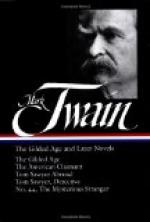The
fiery mid-March sun a moment hung
Above
the bleak Judean wilderness;
Then
darkness swept upon us, and ’t was night.
“Easter-Eve
at Kerak-Moab.”—Clinton Scollard.
The quick-coming winter twilight was already at hand.
Snow was again falling, sifting delicately down,
incidentally as it were.
“Felicia.”
Fanny N. D. Murfree.
Merciful heavens! The whole west, from right to left, blazes up with a fierce light, and next instant the earth reels and quivers with the awful shock of ten thousand batteries of artillery. It is the signal for the Fury to spring—for a thousand demons to scream and shriek—for innumerable serpents of fire to writhe and light up the blackness.
Now the rain falls—now the wind is let
loose with a terrible shriek—now the lightning
is so constant that the eyes burn, and the thunder-claps
merge into an awful roar, as did the 800 cannon at
Gettysburg. Crash! Crash! Crash!
It is the cottonwood trees falling to earth.
Shriek! Shriek! Shriek! It is the
Demon racing along the plain and uprooting even the
blades of grass. Shock! Shock! Shock!
It is the Fury flinging his fiery bolts into the
bosom of the earth.—
“The
Demon and the Fury.” M. Quad.
Away up the gorge all diurnal fancies trooped into
the wide liberties of endless luminous vistas of azure
sunlit mountains beneath the shining azure heavens.
The sky, looking down in deep blue placidities, only
here and there smote the water to azure emulations
of its tint.—
“In
the Stranger’s Country.” Charles Egbert
Craddock.
There was every indication of a dust-storm, though the sun still shone brilliantly. The hot wind had become wild and rampant. It was whipping up the sandy coating of the plain in every direction. High in the air were seen whirling spires and cones of sand—a curious effect against the deep-blue sky. Below, puffs of sand were breaking out of the plain in every direction, as though the plain were alive with invisible horsemen. These sandy cloudlets were instantly dissipated by the wind; it was the larger clouds that were lifted whole into the air, and the larger clouds of sand were becoming more and more the rule.
Alfred’s eye, quickly scanning the horizon,
descried the roof of the boundary-rider’s hut
still gleaming in the sunlight. He remembered
the hut well. It could not be farther than four
miles, if as much as that, from this point of the
track. He also knew these dust-storms of old;
Bindarra was notorious for them: Without thinking
twice, Alfred put spurs to his horse and headed for
the hut. Before he had ridden half the distance
the detached clouds of sand banded together in one
dense whirlwind, and it was only owing to his horse’s
instinct that he did not ride wide of the hut altogether;
for during the last half-mile he never saw the hut,
until its outline loomed suddenly over his horse’s
ears; and by then the sun was invisible.—
“A
Bride from the Bush.”




